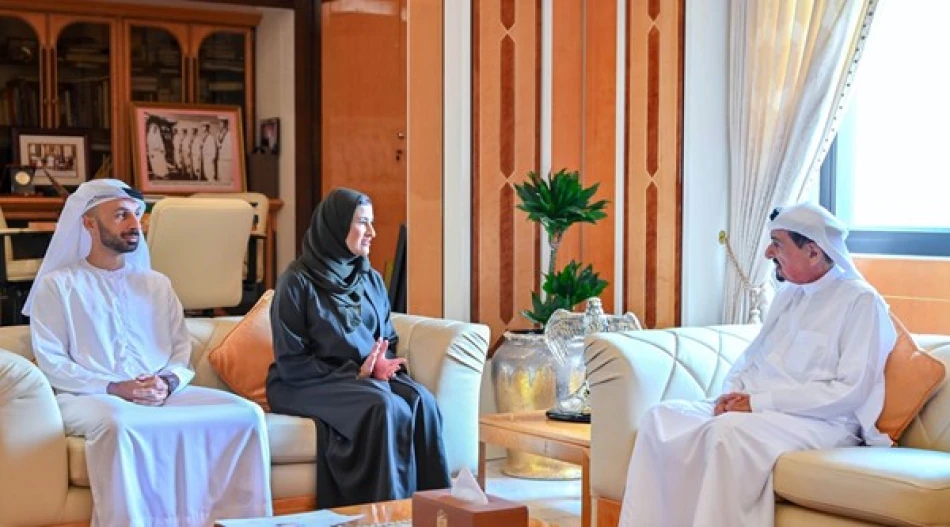
Sharjah Ruler Receives Education Minister, Discusses New Academic Year Preparations
UAE's Ajman Emirate Reinforces Education as Strategic Priority Ahead of 2025-26 Academic Year
The UAE's commitment to education as a cornerstone of economic diversification took center stage as Ajman's leadership met with federal education officials to finalize preparations for the upcoming academic year. The high-level discussions underscore how smaller emirates are aligning their educational strategies with national Vision 2071 goals, positioning human capital development as critical infrastructure for post-oil economic sustainability.
Strategic Alignment Between Federal and Emirate-Level Education Policy
Sheikh Hamid bin Rashid Al Nuaimi, Ruler of Ajman, received UAE Minister of Education Sarah bint Youssef Al Amiri at the Emiri Diwan, where discussions centered on readiness preparations for the 2025-26 academic year. The meeting, attended by Crown Prince Sheikh Ammar bin Hamid Al Nuaimi, signals the coordinated approach between federal education policy and emirate-level implementation that has become a hallmark of UAE governance.
During the session, Minister Al Amiri briefed the Ajman leadership on the ministry's latest developments and preparatory measures for the new academic year, emphasizing the systematic approach to educational excellence that has helped the UAE climb international education rankings over the past decade.
Education as Economic Infrastructure in the UAE Model
Sheikh Hamid emphasized that under President Sheikh Mohamed bin Zayed Al Nahyan's leadership, the UAE treats education as exceptional infrastructure—not just social policy, but economic strategy. This perspective reflects the UAE's broader understanding that sustainable development in a post-hydrocarbon economy depends fundamentally on human capital quality.
The Ajman ruler highlighted that continuous investment in education reflects the leadership's belief that investing in minds represents the most profitable and sustainable form of capital allocation. This philosophy aligns with successful models seen in Singapore and South Korea, where education spending is viewed through an economic competitiveness lens rather than purely social welfare.
Modern Curriculum Development and Global Competitiveness
The leadership praised national plans and initiatives aimed at curriculum modernization and adoption of contemporary teaching methodologies. These efforts focus on preparing generations capable of adapting to rapid technological change while serving national development objectives with competence and distinction.
This approach mirrors strategies employed by other knowledge economy leaders, where educational systems are continuously recalibrated to match evolving industry demands and technological disruption patterns.
Emirate-Level Implementation Strategy
Crown Prince Sheikh Ammar emphasized that Ajman places education at the forefront of its priorities, recognizing its fundamental role in developing aware and creative citizens who can contribute meaningfully to national and community service.
The Crown Prince outlined how Ajman's government mobilizes all available resources to support educational institutions within the emirate, maintaining continuous cooperation with the federal Ministry of Education to ensure school readiness and optimal conditions for both students and teachers.
Vision 2030 Integration
Sheikh Ammar stressed that societal advancement depends fundamentally on educated generations capable of innovation and meaningful contribution to development trajectories. He positioned education as the primary engine for achieving Ajman Vision 2030 and the emirate's leadership and progress aspirations.
This integration of educational policy with long-term economic planning demonstrates the UAE's systematic approach to development, where social investments are explicitly tied to measurable economic outcomes and competitive positioning.
Federal-Emirate Coordination Model
Minister Al Amiri expressed appreciation for the Ajman ruler's continuous attention and follow-up on the education sector, praising his ongoing support for educational institutions in Ajman and creation of optimal environments for students and teachers. She confirmed that this attention enhances education quality and sustainability within the emirate.
This coordination model represents a distinctive aspect of UAE governance, where federal policy frameworks are implemented through emirate-level customization while maintaining national standards and objectives. The approach allows for local adaptation while ensuring systemic coherence across the federation.
Implications for Regional Education Competition
The emphasis on educational excellence positions the UAE within broader regional competition for knowledge economy leadership. As neighboring countries like Saudi Arabia invest heavily in educational transformation through Vision 2030, and Qatar continues developing its Education City model, the UAE's coordinated federal-emirate approach represents a distinctive governance advantage.
The systematic preparation for each academic year, combined with continuous curriculum modernization and infrastructure investment, suggests the UAE is building sustainable competitive advantages in human capital development that will likely yield economic returns over the coming decades.
Most Viewed News

 Layla Al Mansoori
Layla Al Mansoori






